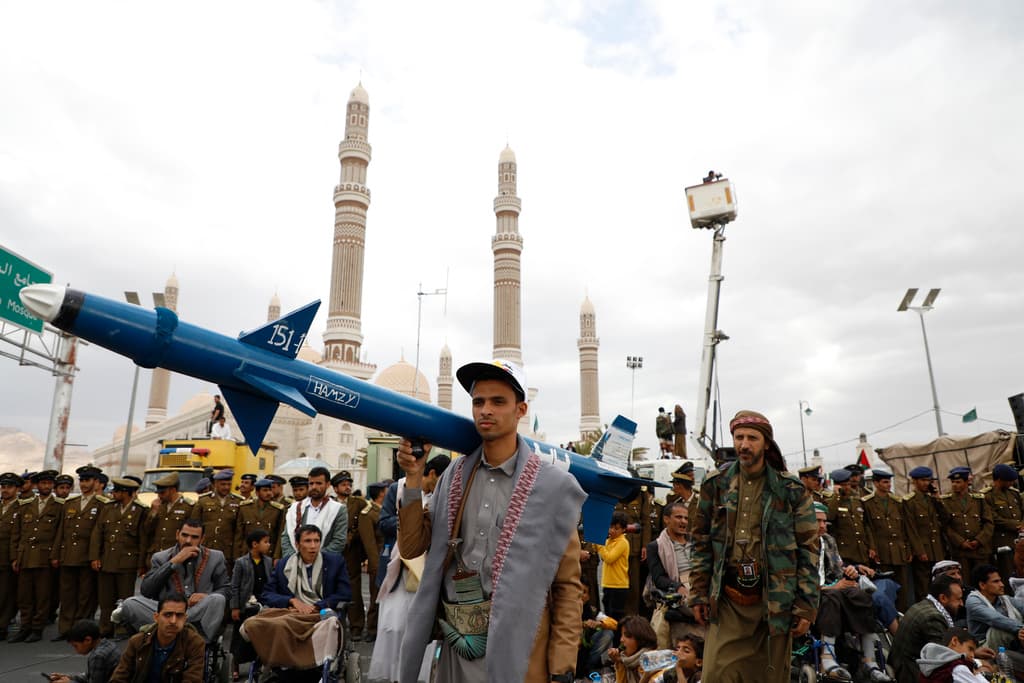Biden’s Early Errors on Iran Are Handcuffing Washington in Middle East and Beyond
Under the 2015 nuclear deal with Iran, a total ban on Tehran’s exports of missiles and drones expired in November. Last fall’s failure to strike down the UN writ legalized Iranian arms deals with Russia, making it difficult for America to push back.

President Biden’s early mistakes regarding Iran policy are increasingly haunting Washington, and America is now struggling to put out fires in the Mideast and beyond as it plays catch up.
Despite several American strikes on Houthi targets in Yemen and a reported cyber hit on the Iranian spy ship Behshad, and even as Europeans are planning to send a maritime strike force to the region, attacks on Red Sea commercial shipping are escalating.
Beyond the slowdown in world commerce that results from these attacks, Iran’s growing arms trade with Russia is complicating America’s efforts to help Ukraine. The Islamic Republic is also tightening relations with Communist China, its largest oil buyer since enforcement of Iran export sanctions has lessened considerably.
An American drone was downed by the Houthis this week. Two anti-ship missiles were launched Tuesday night at the Sea Champion, an American-owned carrier delivering humanitarian aid to Yemen. The crew of the British-registered Rubymar was forced to abandon ship after it was hit Sunday. The extent of damage to the vessel is unknown, and it might have sunk.
The Iranian-backed Houthis seem undeterred by a spate of American military activity that followed last month’s attack on a U.S. post in Jordan, where three American troops were killed. The Yemeni terrorists, who claim to aid Gaza, are all but blocking ship movement in the Red Sea, through which 15 percent of world commerce passes. Ironically, the economies of India, Egypt, and Europe are being hit harder than Israel’s.
On Friday, the Department of State restored President Trump’s listing of the Houthis as a Specially Designated Global Terrorist group, after Mr. Biden, in one of his first acts as president, had removed the Iran-backed group from the terrorist list. Rather than devising a coherent policy on the Houthis, “we’re just back to 2021,” an Iran watcher at the Foundation for Defense of Democracies, Behnam Ben Taleblu, says.
America is attempting to achieve deterrence that was lost by early attempts to lure the Islamic Republic back to the 2015 nuclear deal that was abandoned by Mr. Trump in 2018. In the process, Mr. Biden declared a regional foe of Iran, Saudi Arabia, a “pariah,” and criticized its war, alongside the United Arab Emirates, against the Houthis.
Iran has armed the Houthis — whose slogan is “death to America, death to Israel, curse the Jews, long live Islam” — to the teeth. Now America and several partners are trying to deter the Yemeni group and its Tehran patrons from further disrupting Red Sea commerce.
America’s attacks on Houthi targets and its redesignation as a terror group are welcome, “but we didn’t lose deterrence overnight in the Middle East, and we are not going to regain it overnight,” Mr. Ben Taleblu tells the Sun. “Why didn’t the administration react more forcefully early-on to the Houthi threat, and what did waiting achieve?”
In the Mideast, Iran’s war through proxies consists of an anti-Israel “ring of fire” and an “axis of resistance” that acts against other regional enemies. Yet, allowed for decades to beef up its arms industry, the mullahs have now emerged as a top Russian partner, exporting and developing missiles and drones that help the assault on Ukraine, and may well show up elsewhere in Europe.
Iran has provided Russia with some 400 surface-to-surface missiles, Reuters reported Wednesday, based on Iranians sources. Those include the Fateh-110 family of short-range ballistic weapons, such as the Zolfaghar, which is capable of striking targets up to 435 miles away. Some of these missiles are shipped through the Caspian Sea, while others are sent via air.
Additionally, since the start of the Ukraine war Russia has purchased at least 6,000 Shahed-136 drones, and received extensive aid in setting up local production lines for the drones, Haaretz reported on Wednesday, based on a trove of leaked documents and emails from an Iranian defense industry firm. Moscow is partially paying for these deals with several tons of gold ingots.
Last year Washington failed to trigger the “snapback” option of a United Nations Security Council resolution that legalized the 2015 nuclear deal. According to that deal, a total ban on Iran’s exports of missiles and drones expired in November. Last fall’s failure to strike down the UN writ legalized Iranian arms deals with Russia, making it difficult for America to push back.
The failure to revive a UN arms embargo long after the futility of Washington’s Iran overtures were obvious to all is emblematic of how American global deterrence was lost. Mr. Biden’s early, idealistic misconceptions about the power of diplomacy are likely to undermine America’s interests long after they are replaced with more reality-based policies.

